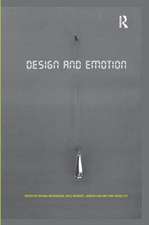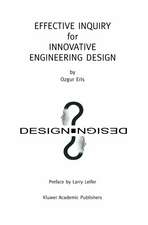Routledge Handbook of Sustainable Design: Routledge Environment and Sustainability Handbooks
Editat de Rachel Beth Egenhoeferen Limba Engleză Paperback – 12 dec 2019
Just as there are multiple definitions of design, so there are several definitions of sustainability, making it difficult to find unity. The term can sometimes be seen as a goal to achieve, or a characteristic to check off on a list of criteria. In actuality, we will never finish being sustainable. We must instead always strive to design, work, and live sustainably. The voices throughout this handbook present many different characteristics, layers, approaches, and perspectives in this journey of sustaining.
This handbook divides into five sections, which together present a holistic approach to understanding the many facets of sustainable design:
Part 1: Systems and Design
Part 2: Global Impact
Part 3: Values, Ethics, and Identity
Part 4: Design for Behavior Change
Part 5: Moving Forward
This handbook will be invaluable to those wishing to broaden their understanding of sustainable design and students and practitioners of Environmental Studies, Architecture, Product Design and the Visual Arts.
| Toate formatele și edițiile | Preț | Express |
|---|---|---|
| Paperback (1) | 356.63 lei 6-8 săpt. | |
| Taylor & Francis – 12 dec 2019 | 356.63 lei 6-8 săpt. | |
| Hardback (1) | 1577.18 lei 6-8 săpt. | |
| Taylor & Francis – 15 apr 2024 | 1577.18 lei 6-8 săpt. |
Din seria Routledge Environment and Sustainability Handbooks
- 8%
 Preț: 446.44 lei
Preț: 446.44 lei -
 Preț: 344.05 lei
Preț: 344.05 lei -
 Preț: 345.96 lei
Preț: 345.96 lei -
 Preț: 375.80 lei
Preț: 375.80 lei -
 Preț: 341.55 lei
Preț: 341.55 lei -
 Preț: 332.04 lei
Preț: 332.04 lei - 15%
 Preț: 427.16 lei
Preț: 427.16 lei -
 Preț: 355.44 lei
Preț: 355.44 lei - 9%
 Preț: 1350.07 lei
Preț: 1350.07 lei - 8%
 Preț: 445.41 lei
Preț: 445.41 lei - 26%
 Preț: 1359.11 lei
Preț: 1359.11 lei - 25%
 Preț: 1223.03 lei
Preț: 1223.03 lei -
 Preț: 449.41 lei
Preț: 449.41 lei - 15%
 Preț: 441.09 lei
Preț: 441.09 lei - 25%
 Preț: 352.95 lei
Preț: 352.95 lei - 27%
 Preț: 1229.98 lei
Preț: 1229.98 lei - 26%
 Preț: 1218.32 lei
Preț: 1218.32 lei - 26%
 Preț: 1189.60 lei
Preț: 1189.60 lei -
 Preț: 460.58 lei
Preț: 460.58 lei - 25%
 Preț: 1192.62 lei
Preț: 1192.62 lei - 11%
 Preț: 306.64 lei
Preț: 306.64 lei - 15%
 Preț: 483.15 lei
Preț: 483.15 lei - 26%
 Preț: 1187.85 lei
Preț: 1187.85 lei - 18%
 Preț: 1565.66 lei
Preț: 1565.66 lei - 15%
 Preț: 509.71 lei
Preț: 509.71 lei - 23%
 Preț: 410.54 lei
Preț: 410.54 lei - 26%
 Preț: 1356.60 lei
Preț: 1356.60 lei - 25%
 Preț: 1221.45 lei
Preț: 1221.45 lei - 18%
 Preț: 1558.26 lei
Preț: 1558.26 lei - 25%
 Preț: 1218.92 lei
Preț: 1218.92 lei - 11%
 Preț: 350.19 lei
Preț: 350.19 lei - 25%
 Preț: 1260.99 lei
Preț: 1260.99 lei - 18%
 Preț: 1563.17 lei
Preț: 1563.17 lei - 26%
 Preț: 1188.43 lei
Preț: 1188.43 lei - 25%
 Preț: 1220.17 lei
Preț: 1220.17 lei - 15%
 Preț: 507.27 lei
Preț: 507.27 lei
Preț: 356.63 lei
Nou
Puncte Express: 535
Preț estimativ în valută:
68.24€ • 71.25$ • 56.48£
68.24€ • 71.25$ • 56.48£
Carte tipărită la comandă
Livrare economică 04-18 aprilie
Preluare comenzi: 021 569.72.76
Specificații
ISBN-13: 9780367877842
ISBN-10: 0367877848
Pagini: 548
Dimensiuni: 174 x 246 x 28 mm
Greutate: 0.45 kg
Ediția:1
Editura: Taylor & Francis
Colecția Routledge
Seria Routledge Environment and Sustainability Handbooks
Locul publicării:Oxford, United Kingdom
ISBN-10: 0367877848
Pagini: 548
Dimensiuni: 174 x 246 x 28 mm
Greutate: 0.45 kg
Ediția:1
Editura: Taylor & Francis
Colecția Routledge
Seria Routledge Environment and Sustainability Handbooks
Locul publicării:Oxford, United Kingdom
Public țintă
Postgraduate and ProfessionalCuprins
Introduction
Rachel Beth Egenhoefer
1. The Political Economy of Design in a Hotter Time
David W. Orr
Part 1: Systems and Design
2. Systems Thinking for Design
Diana Wright, Marta Ceroni
3. Design Strategies for Impact
John Bruce
4. Applied Sustainability
Wendy Jedlička, Jeremy Faludi, Dr. Pete Markiewicz, Tim Frick, Mark McCahill
5. Sustainable Design for Scale
Andrea Steves, Rebecca Silver
6. Systems and Service Design and the Circular Economy
Rhoda Trimingham, Ksenija Kuzmina, Yaone Rapitsenyane,
7. Ecological Theory in Design: Participant Designers in an Age of Entanglement
Joanna Boehnert
Part 2: Global Impact
8. Global Perspectives for Sustainable Design
Douglas Bourn
9. Politics and Sustainability
Harold Wilhite
10. Design for Localization
Helena Norberg-Hodge
11. Intercultural Collaborations in Sustainable Design Education
Denielle Emans, Kelly Murdoch-Kitt
12. Life cycle thinking and sustainable design for emerging consumer electronic product systems
Erinn G. Ryen, Callie W. Babbitt, Alex Lobos
13. Data Clouds and the Environment
Arman Shehabi
14. Increasing Urban Sustainability using GIS
Luiz Felipe Guanaes Rego, Maria Fernanda Campos Lemos, Luís Carlos Soares Madeira Domingues
Part 3: Values, Ethics, and Identity
15. Empathy, Values, and Situated Action: Sustaining People and Planet Through Human Centered Design
Bruce Hanington
16. Practicing Empathy to Connect People and the Environment
Theresa J. Edmonds
17. Surrendering to the ocean: Practices of mindfulness and presence in designing
Yoko Akama
18. Confronting the Five Paradoxes of Humanitarian Design
Brita Fladvad Nielsen
19. Co-Designing for Development
Rachel Beth Egenhoefer
1. The Political Economy of Design in a Hotter Time
David W. Orr
Part 1: Systems and Design
2. Systems Thinking for Design
Diana Wright, Marta Ceroni
3. Design Strategies for Impact
John Bruce
4. Applied Sustainability
Wendy Jedlička, Jeremy Faludi, Dr. Pete Markiewicz, Tim Frick, Mark McCahill
5. Sustainable Design for Scale
Andrea Steves, Rebecca Silver
6. Systems and Service Design and the Circular Economy
Rhoda Trimingham, Ksenija Kuzmina, Yaone Rapitsenyane,
7. Ecological Theory in Design: Participant Designers in an Age of Entanglement
Joanna Boehnert
Part 2: Global Impact
8. Global Perspectives for Sustainable Design
Douglas Bourn
9. Politics and Sustainability
Harold Wilhite
10. Design for Localization
Helena Norberg-Hodge
11. Intercultural Collaborations in Sustainable Design Education
Denielle Emans, Kelly Murdoch-Kitt
12. Life cycle thinking and sustainable design for emerging consumer electronic product systems
Erinn G. Ryen, Callie W. Babbitt, Alex Lobos
13. Data Clouds and the Environment
Arman Shehabi
14. Increasing Urban Sustainability using GIS
Luiz Felipe Guanaes Rego, Maria Fernanda Campos Lemos, Luís Carlos Soares Madeira Domingues
Part 3: Values, Ethics, and Identity
15. Empathy, Values, and Situated Action: Sustaining People and Planet Through Human Centered Design
Bruce Hanington
16. Practicing Empathy to Connect People and the Environment
Theresa J. Edmonds
17. Surrendering to the ocean: Practices of mindfulness and presence in designing
Yoko Akama
18. Confronting the Five Paradoxes of Humanitarian Design
Brita Fladvad Nielsen
19. Co-Designing for Development
Notă biografică
Rachel Beth Egenhoefer is a designer, artist, writer, and professor, whose work integrates technology, craft, and design. Her work focuses on sustainability and systems thinking in the context of behavior change. As an educator, she is involved in several initiatives to promote sustainability in both the design field and across higher education curricula. Egenhoefer is an Associate Professor of Design in the Department of Art + Architecture at the University of San Francisco.
Recenzii
"A timely book that (finally) situates design within a systems context. Diverse articles examine the social and environmental implications of designed images, artifacts, systems and structures in a globally inter-connected and interdependent world as well as the ethics and values that underpin them. Essential reading for designing responsibly in the 21st century." — Terry Irwin, Head, School of Design, Carnegie Mellon University
"This compelling collection is an outstanding resource for people who see design as a tool that can be used to create a better civilization, whether they be practitioners, students, researchers, or enthusiasts. Egenhoefer reminds us of our responsibility to use our professional skills and opportunities to not just do good design, but to do good!" — David Berman, RGD, FGDC, Sustainability Chair, Icograda/ico-D
"The comprehensive and anticipatory nature of this book is profoundly informative and operationally useful in ways that previous books have not been. It is by being so comprehensive on the front end that we designers can mitigate the Law of Unintended Consequences that has so often plagued the practice of design.
While this book is aimed at designers, it would also be useful for political leaders, policy makers and theoretical thinkers in any field. As a society, we are woefully silo-ed by profession, nationality and paradigm. This condition does not accrue to our collective benefit. Any approach that seeks to dismantle this myopic state of affairs will persevere. This book seeks to do just that."— Peter Dean, Co-Founder and Concentration Coordinator, Nature Culture Sustainability Studies Concentration, Rhode Island School of Design (RISD)
"We are only beginning to explore how design can create the conditions for net positive change throughout society. This handbook shows how design thinking is breaking out of its pas
"This compelling collection is an outstanding resource for people who see design as a tool that can be used to create a better civilization, whether they be practitioners, students, researchers, or enthusiasts. Egenhoefer reminds us of our responsibility to use our professional skills and opportunities to not just do good design, but to do good!" — David Berman, RGD, FGDC, Sustainability Chair, Icograda/ico-D
"The comprehensive and anticipatory nature of this book is profoundly informative and operationally useful in ways that previous books have not been. It is by being so comprehensive on the front end that we designers can mitigate the Law of Unintended Consequences that has so often plagued the practice of design.
While this book is aimed at designers, it would also be useful for political leaders, policy makers and theoretical thinkers in any field. As a society, we are woefully silo-ed by profession, nationality and paradigm. This condition does not accrue to our collective benefit. Any approach that seeks to dismantle this myopic state of affairs will persevere. This book seeks to do just that."— Peter Dean, Co-Founder and Concentration Coordinator, Nature Culture Sustainability Studies Concentration, Rhode Island School of Design (RISD)
"We are only beginning to explore how design can create the conditions for net positive change throughout society. This handbook shows how design thinking is breaking out of its pas
Descriere
This handbook situates the design practice in relationship to systems, taking into consideration the power design can have in the influence of structures, systems, and interactions that underlie our decisions, values, ethics and identities.It presents a unique and powerful design perspective not found in other collections.





























